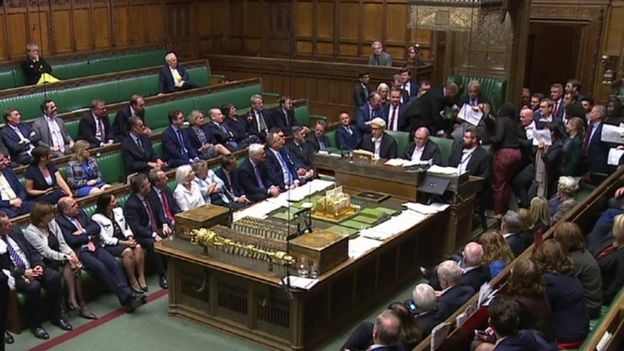Five-week UK parliament shut-down begins

Parliament has officially been suspended for five weeks, with MPs not due back until 14 October.
Amid unprecedented scenes in the Commons, some MPs protested against the suspension with signs saying "silenced" while shouting: "Shame on you."
It comes after PM Boris Johnson's bid to call a snap election in October was defeated for a second time.
Opposition MPs refused to back it, insisting a law blocking a no-deal Brexit must be implemented first.
In all, 293 MPs voted for the prime minister's motion for an early election, far short of the two thirds needed.
Mr Johnson will be holding a meeting with his cabinet in Downing Street later this morning.
Parliament was suspended - or prorogued - at just before 02:00 BST on Tuesday.
As Speaker John Bercow - who earlier announced his resignation - was due to lead MPs in a procession to the House of Lords to mark the suspension, a group of angry opposition backbenchers appeared to try to block his way.
Late into the night, MPs also burst into song on the Commons benches, singing traditional Welsh and Scottish songs.
It is normal for new governments to suspend Parliament - it allows them to schedule a Queen's Speech to set out a fresh legislative programme - but the length and timing of the prorogation in this case has sparked controversy.
Meanwhile, on a hectic day of political developments:
The prime minister also suffered another defeat, as MPs backed calls for the publication of government communications relating to the suspension of Parliament and its no-deal plans;
Mr Johnson was warned he could face legal action for flouting the law blocking no deal;
MPs approved, without a vote, a motion from Labour leader Jeremy Corbyn demanding the government abide by the rule of law.
'Strive to get agreement'
At present, UK law states that the country will leave the EU on 31 October, regardless of whether a withdrawal deal has been agreed with Brussels or not.
But new legislation, which was granted royal assent on Monday, changes that, and will force the prime minister to seek a delay until 31 January 2020 unless a deal - or a no-deal exit - is approved by MPs by 19 October.
BBC political editor Laura Kuenssberg said although No 10 insisted it was not looking to break the new law, efforts were under way to examine ways of getting around it.
Mr Johnson said the government would use the time Parliament was suspended to press on with negotiating a deal with the EU, while still "preparing to leave without one".
"No matter how many devices this Parliament invents to tie my hands, I will strive to get an agreement in the national interest," he said.
"This government will not delay Brexit any further."
Did your MP vote for a snap election?
Enter a postcode, or the name or constituency of your MP
Type in 2 or more characters for results.
But he was warned that ignoring the new law could prompt a legal challenge, while some ministers called it "lousy" and said they would "test to the limit" what it required of them.
Mr Johnson told MPs Mr Corbyn had previously said he would back an election if legislation to prevent the government from forcing through a no-deal Brexit on 31 October became law.
"By his own logic, he must now back an election."
But the Labour leader told MPs his party was "eager for an election - but as keen as we are, we are not prepared to risk inflicting the disaster of no deal on our communities, our jobs, our services or indeed our rights".
And he said the prime minister was suspending Parliament to avoid discussions of his plans.
Labour, the SNP, the Liberal Democrats, the Green Party, the Independent Group for Change and Plaid Cymru had met on Monday morning and agreed not to back the motion for an election.
Parliament's suspension means MPs will not get another chance to vote for an early election until they return, meaning a poll would not be possible until November at the earliest.
Tory rebel Sir Oliver Letwin, who last week defied Mr Johnson to vote to block a no-deal outcome, told BBC Radio 4 Today he believed there was now a majority in the Commons to back another referendum.
Asked whether the prime minister would back a further vote, Mr Letwin replied: "Boris has often changed his mind about many things and that's one of his advantages, that he's very flexible so maybe he can."
